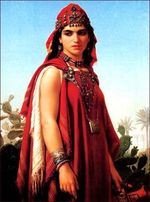Template:Pictorial-Islam-options: Difference between revisions
| [checked revision] | [checked revision] |
mNo edit summary |
mNo edit summary |
||
| Line 1: | Line 1: | ||
<noinclude>Also see: [[Template:Pictorial-Islam]]</noinclude><!-- HELP NOTES: Each option tag handles one random story --><choose> | <noinclude>Also see: [[Template:Pictorial-Islam]]</noinclude><!-- HELP NOTES: Each option tag handles one random story --><choose> | ||
<option weight="1">{{Pictorial-Islam|1=Dhul-Qarnayn and the Alexander Romance|2=[[File:Alexander the Great.jpg|250px|link=Dhul-Qarnayn and the Alexander Romance]]|3=The story of Dhul-Qarnayn in the Qur'an parallels a medieval Syriac legend known as the Alexander romance; it portrays Alexander the Great as a believing king who traveled the world and built a barrier of iron which holds back the tribes of Gog and Magog until Judgement Day. Almost every major element of the Qur'anic story can be found in Christian and Jewish folklore that dates hundreds of years prior to the time of Prophet Muhammad. Most early Muslim commentators and scholars identified Dhul-Qarnayn as Alexander the Great, and some modern ones do too. Historical and Archaeological evidence has revealed that the real Alexander was a polytheistic pagan who believed he was the literal son of Greek and Egyptian gods. | |||
The theory that Dhul-Qarnayn is Cyrus the Great has little evidence in its favor compared to the overwhelming evidence that the story is actually based on a legendary version of Alexander. | |||
Today, there is no giant wall of iron and brass between two mountains that is holding back a tribe of people; it likely never existed.([[Dhul-Qarnayn and the Alexander Romance|''read more'']])}}</option> | |||
Revision as of 10:16, 11 December 2013
Also see: Template:Pictorial-Islam
|
